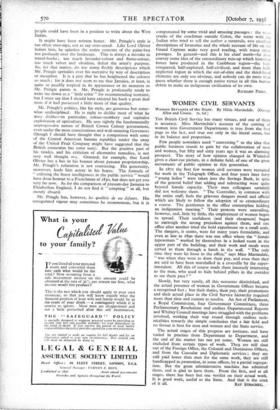WOMEN CIVIL SERVANTS Women Servants of the State. By Hilda
Martindale. (George Allen and Unwin. 7s. 6d.)
THE British Civil Service has many virtues, and one of them is accuracy. Miss Martindale's account of the coming of women into Government Departments is true from the first page to the last, and true not only in the literal sense, but in its balance and proportion.
Few people nowadays need " converting " to the idea that public business stands to gain by the collaboration of men and women, but fifty and sixty years ago it was an alarming prospect. The story of how opinion changed in Whitehall gives a clear-cut picture, in a definite field, of one of the great movements of public opinion in this generation.
In 1871 the first few women civil servants were recruited for work in the Telegraph Office, and four years later forty " young ladies " were taken into the Savings Bank, in spite of the general belief that adding and subtracting were quite beyond female capacity. Their men colleagues certainly did not welcome them. " The Controller, in common with the entire staff, feels the grievous dangers moral and official which are likely to follow the adoption of so extraordinary a course. The gentlemen in the office contemplate holding an indignation meeting." Their protests were unavailing, however, and, little by little, the employment of women began to spread. Their usefulness (and their cheapness) began to outweigh the strong prejudices against them, and one office after another tried the bold experiment on a small scale. The dangers, it seems, were for many years formidable, and even as late as 1890 there was one office where the " female typewriters " worked by themselves in a locked room in the upper part of the building, and their work and meals were served to them through a hatch in the wall. " The only time they were let loose in the office," says Miss Martindale, " was when they went to draw their pay, and even then they are said to have been marshalled in a crocodile by the super- intendent. All this of course made them intensely interesting to the men, who used to hide behind pillars in the corridor to see them pass ! "
Slowly, but very surely, all this nonsense diminkhed, and the actual presence of women in Government Offices became a recognised fact ; but their duties, their pay, their promotions and their actual place in the Civil Service hierarchy required more than time and custom to resolve. An Act of Parliament, a Royal Commission, four Government Committees, three Parliamentary Resolutioni and endless Departmental Reports and Whitley Council meetings have struggled with the problems involved, working their way round through endless tech- nicalities towards the simple conclusion that a fair field and no favour is best for men and women and the State service.
The actual stages of this progress are intricate, and have varied in practice from Department to Department, and the end of the matter has not yet come. Women are still excluded from certain types of work. They are still shut out of the Foreign Office, the Colonial and Dominions Offices, and from the Consular and Diplomatic services ; they are still paid lower than men for the same work, they are still handicapped in promotion, in some offices, by a partial segrega- tion. But the great administrative machine has admitted them, and is glad to have them. From the first, and at all stages, there has been but one verdict on their actual work. It is good work, useful to the State. And that is the crux














































 Previous page
Previous page